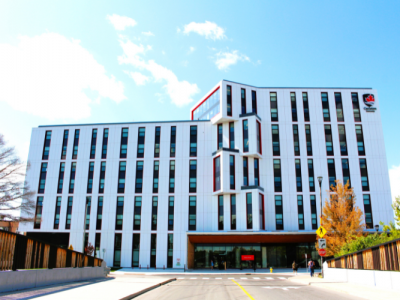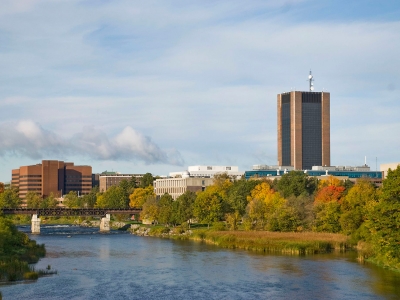Younger Canadians are most likely to have had their family income reduced as a result of COVID-19. They’re also more bullish about the need to reopen the economy, less inclined to be keeping up with news about the pandemic and less likely to be following recommended guidance about physical distancing.
These are just a few of the findings from a recent survey which indicates that younger and older Canadians are experiencing the pandemic differently.
The findings come from a Carleton University School of Journalism and Communication survey of 2,000 Canadians conducted by Abacus Data from May 2 to 8. The survey tested for gender, age and regional differences, along with levels of educational attainment and political party affiliation in order to obtain a snapshot of Canadian society. Researchers then broke the respondents into four age groups and cross-examined differences in how each group answered a number of core questions meant to gauge how different generations were being impacted by and reacting to the ongoing public health crisis.
The age groups were:
Age 18 to 29: 20 per cent of respondents
Age 30 to 44: 25 per cent of respondents
Age 45 to 59: 27 per cent of respondents
Age 60 plus: 28 per cent of respondents
The research highlights a generational divide in terms of how the pandemic is impacting Canadians and how Canadians are reacting to it.
While COVID-19 is more deadly to older generations, the financial impact of the pandemic is hitting Canadians under 30 (millennials and members of Generation Z) harder than baby boomers (born 1946 to1964) or those identified as part of Generation X (born 1965 to1980).
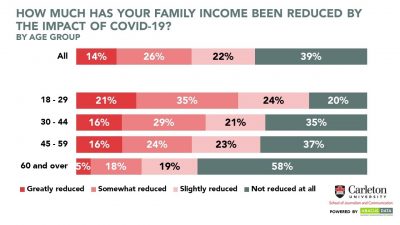
The research also shows that age appears to be an important factor in whether Canadians are adhering to official public health guidance. Only 46 per cent of respondents aged 18 to 29 reported that they “always” follow the recommended guidance from public health officials about physical distancing compared to 71 per cent of Canadians aged 60 and over. Though a further 42 per cent of younger respondents indicated that they follow the recommendations “most of the time,” the data shows that the older generations are taking the recommendations more seriously than others.
“A lot of millennials have been complaining about how baby boomers have been handling themselves through the pandemic, but it seems that the older generations might actually be taking the public health advice more seriously than their children or their grandchildren,” says Brett Popplewell, professor in the School of journalism and communication and one of the project’s co-investigators.
“We didn’t find a single Canadian over the age of 60 who said they never followed the guidelines, but we did find some outliers in every other age group.”
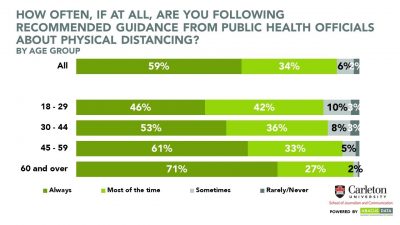
The research also showed that younger individuals (aged 18 to 29) with a lower adherence to social distancing were also less likely to say they were worried about COVID-19. Individuals in this age group also said they weren’t keeping as close an eye on daily news about COVID-19 and were slightly more likely to believe in several discredited conspiracy theories than older people surveyed, such as the hype around hydrochloroquine, that the illness is being spread to cover up harmful effects from exposure to 5G wireless and that the virus was concocted as a bioweapon.
“Younger Canadians are significantly more reliant on Google and social media for their news, yet less inclined altogether to keep up with the daily news agenda as defined by more traditional news outlets,” says Popplewell.
Across the board, Canadians have begun following the daily news cycle much more closely than they were before the pandemic, but the younger generations remain the least likely to be tuning in on a daily basis.
“Before the current public health crisis, only 15 per cent of Canadians aged 18 to 29 said they were keeping up with the news every day,” says Popplewell. “That number has almost doubled, but this age group still doesn’t seem to be paying as close attention to the news as their parents’ or grandparent’s generations.”
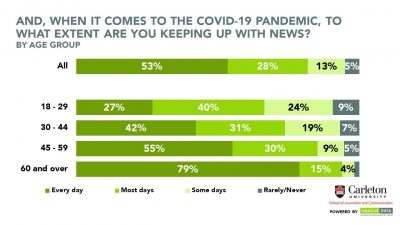
Researchers also noted that although only eight per cent of all respondents felt that public health restrictions should be immediately suspended, the strongest support came from younger Canadians. Younger individuals were also more likely to say that it was more important to get the economy going again as soon as possible even if that leads to more illness and deaths.
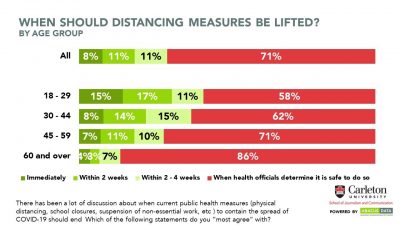
Notes on Methodology:
The public opinion survey noted above is a project of the School of Journalism and Communication at Carleton University funded by its Faculty of Public Affairs and supported by Abacus Data. A second phase of the survey will be conducted in early June, with a comprehensive report to follow.
The first phase of the survey was conducted with 2,000 Canadian residents from May 5 to 8, 2020. The margin of error for a comparable probability-based random sample of the same size is +/- 2.19 per cent, 19 times out of 20.
The data were weighted according to census data to ensure that the sample matched Canada’s population according to age, gender, educational attainment, and region. Totals may not add up to 100 due to rounding.
For more information:
Brett Popplewell
Assistant Professor
School of Journalism and Communication
Carleton University
brett.popplewell@carleton.ca
Thursday, May 21, 2020 in News Releases
Share: Twitter, Facebook

